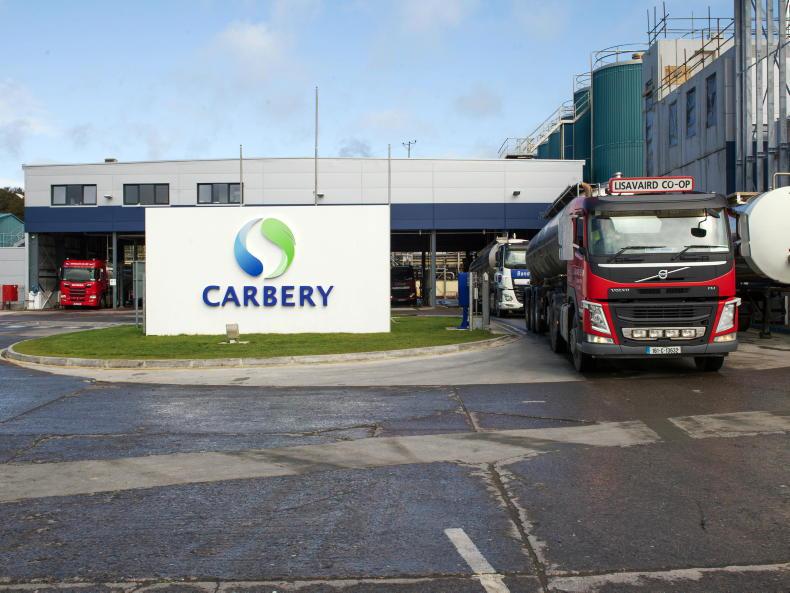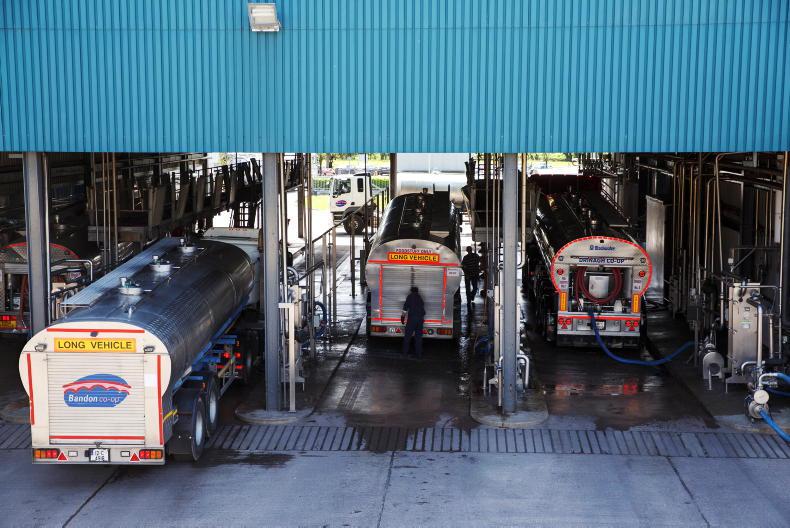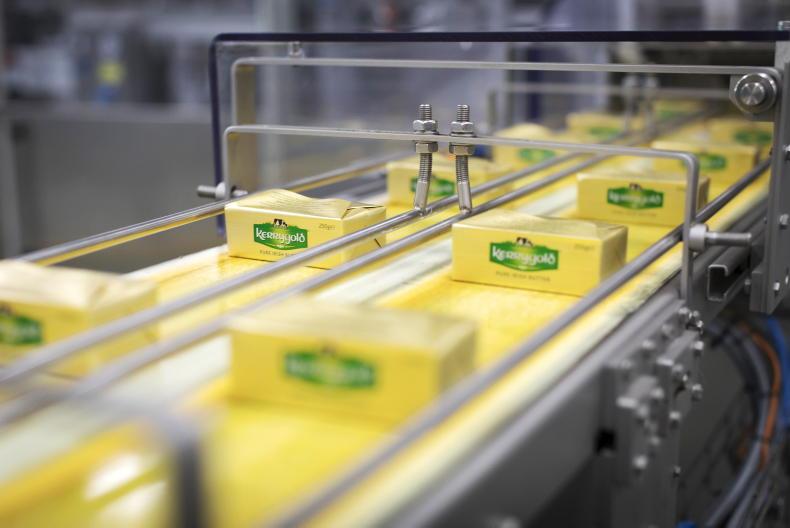For the last number of weeks, farmers have been saying to me that our co-op structure will protect the incomes of Irish dairy farmers and not let it slide. Are they right? For me it’s one of those yes and no answers.
So, let’s break it down.
The answer is yes because of:
OWNERSHIP: The dairy farmers are the owners of the business – milk suppliers are shareholders in the business and employ management to run it. The board of each co-op effectively controls the destiny – it decides what to put towards milk price and what funds to keep in the business.
RESERVES: Co-ops have financial reserves that they can use to support the milk price. For example, Carbery this week decided to cut its base price by 1.5c/l, but took the 1.5c/l out of a stability fund it had created when milk returns were better. The net effect is the west Cork dairy farmers won’t suffer a milk price reduction this time around. The farmers did, of course, create the fund previously so it’s just a timing piece.
FUNDS: Co-ops have the ability to delve deeper into reserves and take a negative hit on the balance sheet. Private companies or publicly listed companies are not able to do this as easily because they will be looking to retain a strong balance sheet or a strong share price.
ORNUA: Most Irish co-ops are members of central marketing body Ornua – formerly the Irish Dairy Board. Ornua has the scale to access funds from financial companies at good rates and has an agreement with member co-ops to pay them 14 days after the product is sold from the co-op to Ornua. If it was sold elsewhere, you could be looking at a 30- to 60-day wait.
PRODUCT MIX: While some Irish co-ops are more heavily weighted to one product in general, they tend to have a diversified basket of goods – cheese, powders, butter, skim etc. So if one product is returning poorly, they have options to make more of a higher-returning product.
The answer is no because of:
BUSINESS REALITIES: As most of the product produced on the island of Ireland is exported, if the global price of butter, cheese and powder falls, then so must the price of the product fall between the seller and buyer if you want to complete the deal.
REAL COSTS: All co-ops have a cost structure – some better than others. These costs still need to be met irrespective of what revenue the business can generate. Yes a business can decide to cut costs, lay off staff (as has been done in Lakeland already). Management can take a pay cut to reduce costs also. So, rather than the farmer taking all the hit, costs can be cut.
LONG-TERM INVESTMENT: It’s easy pay out everything on milk price and come out on top of the league but not have any growth or development in the business. If a business decides to invest for greater capacity, it often will have long-term bank debt that needs to be repaid and can’t be adjusted in the short term to manage milk price payout.
In summary
So, in summary, our co-op structure in Ireland brings very definite benefits, but you can’t escape business realities. That’s doesn’t mean the co-ops were right to drop March milk price, which I still suggest was too early and unjustified. However, the farmer boards that milk suppliers have elected have taken that decision and it’s up to farmers to relate their thoughts back to the board representatives on what their vision and strategy is.
Farmers have a couple of benchmarks and one is the Ornua price for a basket of goods and how that compares to the co-op price. The other benchmark is to watch what other similar co-ops are paying.
The alternative to the co-ops plays out in other parts of Europe. Private companies are buying milk from farmers and some have said to farmers they have enough milk – ie don’t milk any more cows. Or, we’ll pay you this milk price because we want to retain a certain profitability in the business so you’ll just have to take what you are given and the suppliers have no choice in the matter.
For anyone interested in what’s happening in other countries in terms of milk price, watch the Farm Tech Talk – Dairy special. We talk to Monaghan man Olin Greenan farming in New Zealand, Lloyd Holterman farming in Wisconsin and Ornua’s Colin Kelly on milk supply and demand flows.
Read more
Watch: Farm Tech Talk - a dairy special
Farm organisations come out strong against price cuts
Carbery and Dairygold set March milk prices
For the last number of weeks, farmers have been saying to me that our co-op structure will protect the incomes of Irish dairy farmers and not let it slide. Are they right? For me it’s one of those yes and no answers.
So, let’s break it down.
The answer is yes because of:
OWNERSHIP: The dairy farmers are the owners of the business – milk suppliers are shareholders in the business and employ management to run it. The board of each co-op effectively controls the destiny – it decides what to put towards milk price and what funds to keep in the business.
RESERVES: Co-ops have financial reserves that they can use to support the milk price. For example, Carbery this week decided to cut its base price by 1.5c/l, but took the 1.5c/l out of a stability fund it had created when milk returns were better. The net effect is the west Cork dairy farmers won’t suffer a milk price reduction this time around. The farmers did, of course, create the fund previously so it’s just a timing piece.
FUNDS: Co-ops have the ability to delve deeper into reserves and take a negative hit on the balance sheet. Private companies or publicly listed companies are not able to do this as easily because they will be looking to retain a strong balance sheet or a strong share price.
ORNUA: Most Irish co-ops are members of central marketing body Ornua – formerly the Irish Dairy Board. Ornua has the scale to access funds from financial companies at good rates and has an agreement with member co-ops to pay them 14 days after the product is sold from the co-op to Ornua. If it was sold elsewhere, you could be looking at a 30- to 60-day wait.
PRODUCT MIX: While some Irish co-ops are more heavily weighted to one product in general, they tend to have a diversified basket of goods – cheese, powders, butter, skim etc. So if one product is returning poorly, they have options to make more of a higher-returning product.
The answer is no because of:
BUSINESS REALITIES: As most of the product produced on the island of Ireland is exported, if the global price of butter, cheese and powder falls, then so must the price of the product fall between the seller and buyer if you want to complete the deal.
REAL COSTS: All co-ops have a cost structure – some better than others. These costs still need to be met irrespective of what revenue the business can generate. Yes a business can decide to cut costs, lay off staff (as has been done in Lakeland already). Management can take a pay cut to reduce costs also. So, rather than the farmer taking all the hit, costs can be cut.
LONG-TERM INVESTMENT: It’s easy pay out everything on milk price and come out on top of the league but not have any growth or development in the business. If a business decides to invest for greater capacity, it often will have long-term bank debt that needs to be repaid and can’t be adjusted in the short term to manage milk price payout.
In summary
So, in summary, our co-op structure in Ireland brings very definite benefits, but you can’t escape business realities. That’s doesn’t mean the co-ops were right to drop March milk price, which I still suggest was too early and unjustified. However, the farmer boards that milk suppliers have elected have taken that decision and it’s up to farmers to relate their thoughts back to the board representatives on what their vision and strategy is.
Farmers have a couple of benchmarks and one is the Ornua price for a basket of goods and how that compares to the co-op price. The other benchmark is to watch what other similar co-ops are paying.
The alternative to the co-ops plays out in other parts of Europe. Private companies are buying milk from farmers and some have said to farmers they have enough milk – ie don’t milk any more cows. Or, we’ll pay you this milk price because we want to retain a certain profitability in the business so you’ll just have to take what you are given and the suppliers have no choice in the matter.
For anyone interested in what’s happening in other countries in terms of milk price, watch the Farm Tech Talk – Dairy special. We talk to Monaghan man Olin Greenan farming in New Zealand, Lloyd Holterman farming in Wisconsin and Ornua’s Colin Kelly on milk supply and demand flows.
Read more
Watch: Farm Tech Talk - a dairy special
Farm organisations come out strong against price cuts
Carbery and Dairygold set March milk prices









SHARING OPTIONS